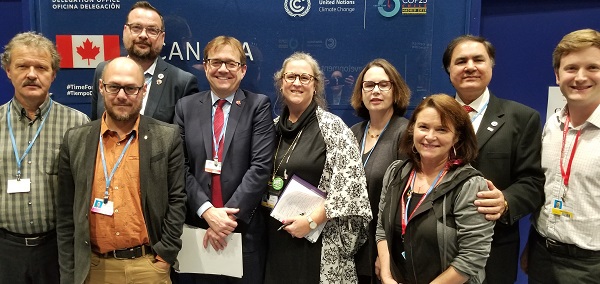As you are well aware, Phoenix pay errors will impact many public servants this tax season. It is most important that you get the answers and compensation that you deserve.
You are entitled to $200 in compensation for tax advice if you have experienced a Phoenix pay issue in the last year. We encourage all eligible members to seek the professional support needed to deal with any Phoenix-related tax issues and claim that expense.
If you received a T4 that contains errors, the Canada Revenue Agency FAQs outline the actions to take.
If you have paid tax penalties that you believe are a direct result of Phoenix errors, you can submit a claim for compensation.
For more information on Phoenix, visit www.pipsc.ca/phoenix.
At this year’s Canadian Labour Congress (CLC) Convention, delegates will elect a new President to lead the labour movement. The PIPSC Board of Directors is proud to endorse Linda Silas, who has over 17 years of union leadership experience.
The Board is confident that she will be able to continue the high-impact work of Hassan Yussuff — current leader of the CLC — and is the best candidate to represent the interests of PIPSC members. Silas has been the President of the 200,000-strong Canadian Federation of Nurses Unions (CFNU) since 2003, was the President of the New Brunswick Nurses Union (NBNU) and is a graduate of l’Université de Moncton.
According to Silas, all workers need representation - from public servants to those in the gig economy. We couldn't agree more.
“Linda is exceptional in high-pressure environments, is a strong advocate of workers’ rights, and has the best understanding of public sector issues from her background as a nurse” says Debi Daviau, PIPSC President. “She is the leader we need to keep the labour movement pushing forward into a new decade of success.”
As an exceptional bilingual advocate who often comments on health, public service and labour issues, we recognize Linda as the foremost advocate on behalf of nurses and all workers across Canada.
At this time, all of our union meetings and events continue to take place. Any travel or meeting related to our union work is always voluntary. Please use your own discretion as to whether or not to adapt your activities.
We are in ongoing communication with the federal government on Coronavirus (COVID-19). A committee was created through the National Joint Council (NJC) to maintain a direct line of communication between the government and unions to ensure coordination and preparedness.
This NJC committee had its first weekly meeting on March 6. The Treasury Board confirmed the development of an internal communication plan around the Coronavirus (COVID-19). The Treasury Board had already sent instructions to heads of human resources and labour relations across departments to deal with the situation. You should be receiving clear direction from your employer.
We will continue to advocate for clear communication from the federal government.
It is important that we share responsibility for workplace wellness. This may include working from home or taking sick time. Wellness of our membership is paramount and we encourage you to contact your steward if you require support to manage an absence from the workplace due to potential illness.
For information on the Coronavirus (COVID-19) visit www.canada.ca/coronavirus or the website for your local health authority.
The 25th Session of the Conference of the Parties (COP25) to the United Nations Framework Convention on Climate Change (UNFCCC) took place from December 2-15, 2019 in Madrid, Spain. More than 26,700 people attended, including over 13,600 government delegates, nearly 10,000 observers, and over 3,000 members of the media. Attendees included representatives of the International Trade Union Confederation (ITUC), the world's largest trade union federation.
PIPSC’s National Capital Region Director Waheed Khan participated as a member of the Canadian Labour Congress (CLC) delegation. A trained scientist and working as a Senior Advisor, Climate Change for the federal government, he was well placed to contribute to the discussions on this issue, undoubtedly the greatest challenge of our times.
At COP25, trade union representatives underscored the need to protect human rights and called for working together towards a Just Transition for workers. Just Transition is a framework developed by the labour movement to encompass a range of social interventions needed to secure workers' rights and livelihoods when economies are shifting to sustainable production, primarily avoiding climate change and protecting biodiversity.
Labour movement delegates pressed government representatives to step up ambition in their national contributions to the fight against climate change, and to support the Climate Action for Jobs Initiative, which was co-launched at COP25 by United Nations Secretary-General António Guterres, and International Labour Organization Director-General, Guy Ryder.
During the Conference, Director Khan participated in a number of meetings with senior government officials from around the world, including Canada’s Minister of Environment and Climate Change, Jonathan Wilkinson. This provided an opportunity to introduce the Minister to PIPSC, to underscore the importance of investments in public science, to highlight the work of Canada’s public scientists and to ensure that Canadians and their elected leaders better understand the challenges of climate change.
While delivering Canada’s National Statement at the Conference, Minister Wilkinson acknowledged the work of the Canadian labour delegation and announced that the government will come forward with legislation that commits it to a net-zero-by-2050 goal, with milestones every five years, paired with a Just Transition Act to make sure people are kept at the centre of its policies. Minister Wilkinson also participated in a Just Transition event organized by ITUC and CLC.
The 2019 federal elections amply demonstrated that climate change is a top of mind issue for millions of Canadians. This is particularly true for PIPSC members, thousands of whom are government scientists working to solve the climate crisis. The Institute and its members can support their colleagues’ critical work by:
- Profiling members who work on climate change and support their speaking engagements, including at PIPSC functions or meetings;
- Reducing or eliminating the use of single-use plastics and other wasteful material at PIPSC functions or meetings;
- Promoting the use of electronic means to conduct meetings;
- As youth is highly mobilized to take action on climate change, supporting our younger members in activities that address the issue.
- Planting trees, as will be done during the Institute’s 100th Anniversary Celebrations, and supporting the government of Canada’s commitment to plant two billion trees.


Many groups are bargaining now and members are working hard to get new collective agreements. You have the full solidarity and support of the 65,000 PIPSC members from coast, to coast, to coast.
Canadian Food Inspection Agency Groups
All three of our Canadian Food Inspection Agency CFIA groups are now in the bargaining process.
Their bargaining teams are currently working hard in collaboration with our professional negotiators to bring a resolution to their bargaining issues.
Computer Systems Group
Our Computer Systems (CS) Group has a Public Interest Commission (PIC) scheduled for June 22 & 23. The role of the PIC is to help both parties come to an agreement. Information sessions and rallies are currently being organized and this group will need everyone’s support, especially if they take on job actions to support their demands.
Manitoba Association of Government Engineers
The Manitoba Association of Government Engineers (MAGE) Group is now negotiating with the government of Manitoba. This provincial government has put forward Bill 28 which seeks to limit workers’ rights. However, wage increase must be negotiated – not legislated by governments. We are fighting Bill 28 in court to ensure our members maintain their right to collective bargaining.
If Bill 28 is not defeated, it would limit annual wage increases to 0% in the first and second years of the collective agreement, 0.75% increase in the third year and a 1% increase in the fourth year. This is well below the basic cost of living increases and is unacceptable.
Nav Canada Group
Nav Canada (NavCan) Group members and their bargaining team have worked hard and members voted March 10 to ratify their tentative agreement.
New Brunswick Groups
Our groups in New Brunswick are now heading into negotiations with the provincial government. Currently, there is a minority conservative government and an election could be called any time. We know these groups will fight hard to get a fair deal no matter the political climate they face.
Ontario Groups
Our members in the Ontario health sector and those working at the University of Ottawa are also beginning negotiations. Much like our members in Manitoba, these groups are up against a regressive provincial government. We are fighting Bill 124 in courts. This bill seeks to undermine workers’ rights by replacing collective bargaining with legislating wages. Bill 124 would cap all wage increase at 1%, below the cost of living. We are fighting back.
Our members working for the Senate, Museum of Nature, Museum of History and Museum of War are also getting ready to engage in negotiations with their respective employer.
We are standing together. Despite the resistance of employers or challenging political climates, we will not back down and we will deliver the best deal possible. We are 60,000 members strong and better together. Solidarity!
On February 11, 2020, the National Research Council (NRC) held a symposium in Ottawa to mark the International Day of Women and Girls in Science. The symposium celebrated women working in STEM (Science, Technology, Engineering and Math) fields across the federal government.
PIPSC Vice-President Norma Domey represented PIPSC at this milestone event as per her portfolios. The highlight of the celebration was a scientific poster session, with an opportunity to view and discuss results from over 100 projects led by women in research-based departments and agencies across the Government of Canada.

Vice-President Domey was pleased to also network with PIPSC women involved in our Science Learning Lab which focuses on systemic solutions to remove barriers experienced by women in science across Canada.
PIPSC is proud to represent the many thousands of women working in STEM across the federal public sector and salutes their invaluable contributions to science and technology in Canada.

Government Selects SAP to work on the Next Generation Human Resources and Pay Solution Pilot
Treasury Board of Canada Secretariat
Mar 06, 2020, 11:01 ET
OTTAWA, March 6, 2020 - Every public servant deserves to be paid accurately and on time. That is why the government is working on creating a long-term, sustainable, and efficient human resources and pay solution that meets the diverse needs of federal employees across Canada.
Today, the Honourable Joyce Murray, Minister of Digital Government, announced that SAP has been selected to work with the government on a pilot to test the real complexities of the government's HR and pay requirements. This follows a rigorous evaluation process involving three qualified vendors undertaken over the past several months.
SAP will work with the Government of Canada on a pilot to test a potential HR and pay solution against the real complexities of the government's HR and pay requirements.
All three vendors – SAP, Ceridian and Workday – remain part of the qualified list of suppliers for future HR and pay work with the government.
Public servants, as well as bargaining agents, have been involved throughout the process and the government is committed to continuing to work with them in the next stages of the project. Long-term work to stabilize the Phoenix Pay System will continue with Public Services and Procurement Canada.
"Canada's hard-working employees should be paid accurately and on time. Today's announcement is an important milestone towards building an efficient next generation solution that is better aligned with the complexity of the federal government's HR and pay structure. I am focused on moving this forward while taking the time to get it right."
- The Honourable Joyce Murray, Minister of Digital Government
"This marks a significant step towards building an HR and pay solution that works. Our members have been called on to support building a new solution that serves their needs, and I am pleased to see that there's a light at the end of the tunnel."
- Debi Daviau, President of the Professional Institute of the Public Service of Canada
"Building on the progress that has already been made, our focus remains on eliminating the backlog and stabilizing the Phoenix pay system, even as the Government takes significant steps towards finding a future solution. Stabilizing the current pay system and ensuring that employees are supported throughout the process are essential requirements for a smooth and successful transition to any new pay system."
- The Honourable Anita Anand, Minister of Public Services and Procurement
"Team SAP looks forward to continuing to work with public servants, unions and employees on a modern, digital solution — one that will meet the needs of the Federal Public Service and its employees."
- Andy Canham, President of SAP Canada
SOURCE: Treasury Board of Canada Secretariat
On February 25, 2020, PIPSC sent a significant delegation to Parliament Hill in Ottawa, part of the Canadian Labour Congress’s annual Lobby Day.
Hundreds of representatives from Canada’s labour movement met with Members of Parliament and Senators, bringing to the forefront issues of importance not just to workers but to all Canadians, including the introduction of a national Pharmacare plan, a national minimum wage and retirement security.




A coalition of Ontario unions, coordinated by the Ontario Federation of Labour (OFL), and representing approximately 270,000 employees and over forty different unions, announced today that they have filed a constitutional challenge to Bill 124, the Protecting a Sustainable Public Sector for Future Generations Act.
Bill 124 violates the collective bargaining rights enshrined in the freedom of association guarantee of the Canadian Charter of Rights and Freedoms.
A growing list of public and private sector unions opposes Bill 124, with this constitutional challenge being a part of the Ontario labour movement’s broader campaign to repeal the Bill.
“Wages are negotiated at the bargaining table, not imposed by legislation. We are proud to stand together with other unions to protect the right to collectively bargain,” said PIPSC President Debi Daviau. “We will not let the Ford government attack our members’ rights. We continue to fight back.”
“Every worker in Canada has the right to freedom of association and to collectively bargain with their employer. The members of this coalition, together with the other unions who have already and will soon launch similar challenges, will protect that right,” said OFL President Patty Coates. “Opposition to Bill 124 will continue to escalate until the government repeals this unconstitutional legislation.”
Bill 124 limits compensation increases, including salaries, pensions and benefits, for millions of unionized broader public sector workers in Ontario to 1% for three year periods, a rate even lower than inflationary increases to the cost of living.
“Workers in this province are standing against cuts to public services in our communities and against violations of our rights under the Charter,” said CUPE Ontario President Fred Hahn. “There are more of us than there are of them, and we are battling this on every front, from MPP offices to the halls of Queen’s Park, rallies in the streets, and now to the courts. The Ford government created a crisis and is now looking for someone to blame, but we refuse to be their scapegoat or to pay this price.”
“This legislation interferes with the rights of Ontario’s faculty to bargain collectively, undermines the autonomy of Ontario’s universities, and will erode the foundations of Ontario’s important public services,” said Michael Conlon, Executive Director of the Ontario Confederation of University Faculty Associations. “OCUFA is proud to be part of this coalition of unions challenging a needless and unconstitutional law.”
“In 2015, the Supreme Court of Canada recognized that the freedom of association guarantee in the Charter of Rights and Freedoms provides constitutional protection for a meaningful right to collectively bargain, and for the right to strike,” said Steven Barrett of Goldblatt Partners, lead counsel for the union coalition.
The coalition of ten unions which first announced their intention to file a Charter challenge in December 2019 has quadrupled in size.
Workers affected by Bill 124, and forming part of the coalition, include those employed by the provincial government, crown agencies, school boards, universities and colleges, hospitals, non-profit long-term care homes, children’s aid societies, social service agencies, and the electricity and energy sectors.
By coordinating resistance efforts, unions have previously successfully challenged legislation that violates workers’ rights, including the previous Liberal Government’s Bill 115. The courts found that Bill 115 violated workers’ Charter rights, and it was ultimately repealed.
“Let me clear: the labour movement in Ontario is united in our opposition to this unnecessary, unfair, and unconstitutional attack on workers’ rights,” said Coates.
PIPSC RCMP civilian members’ concerns have been heard. It’s been recommended that deeming is delayed due to Phoenix.
The President of the Treasury Board, Jean-Yves Duclos, in consultation with the Minister of Public Safety, Bill Blair, has decided to recommend to the Treasury Board not to proceed with the planned RCMP deeming date of May 21, 2020.
“This is the right decision and a win for our members. We are pleased to hear that our civilian members’ concerns with Phoenix have been heard loud and clear,” said Debi Daviau, PIPSC President. “I want to thank all PIPSC members for standing with the RCMP civilian members by emailing decision-makers.”
Thousands of PIPSC members emailed key decision-makers to stop the transition of RCMP civilian members to Phoenix. They asked them to delay deeming and remain with the current pay system until the government introduces a new, fully functional pay system.
Brenda Lucki, the RCMP Commissioner, contacted RCMP civilian members to inform them that extensive testing on the stability of the Phoenix pay system was completed and that they concluded they were “not completely satisfied that all conditions are in place to successfully proceed with deeming.”
“We will continue to work with the Treasury Board and the RCMP Commissioner to ensure that we have a clear path forward. We must ensure that there are appropriate mechanisms to bring the RCMP into the public service,” said Daviau.
As PIPSC leadership continues their work with the RCMP Commissioner, we will keep RCMP civilian members informed of any changes or progress.
The existing terms and conditions of RCMP civilian members’ employment remain unchanged with this announcement.
Any RCMP civilian members who experience any workplace issues should contact their steward.

